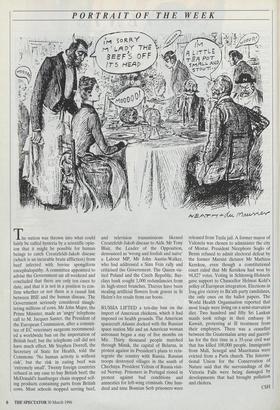PORTRAIT OF THE WEEK T he nation was thrown into what
could fairly be called hysteria by a scientific opin- ion that it might be possible for human beings to catch Creutzfeldt-Jakob disease (which is an incurable brain affliction) from beef infected with bovine spongiform encephalopathy. A committee appointed to advise the Government sat all weekend and concluded that there are only ten cases to date, and that it is not in a position to con- firm whether or not there is a causal link between BSE and the human disease. The Government seriously considered slaugh- tering millions of cows. Mr John Major, the Prime Minister, made an 'angry' telephone call to M. Jacques Santer, the President of the European Commission, after a commit- tee of EC veterinary surgeons recommend- ed a worldwide ban on the importation of British beef; but the telephone call did not have much effect. Mr Stephen Dorrell, the Secretary of State for Health, told the Commons: 'No human activity is without risk', but the risk in eating beef was 'extremely small'. Twenty foreign countries refused in any case to buy British beef; the McDonald's hamburger chain stopped sell- ing products containing parts from British cows. Most schools stopped serving beef, and television transmissions likened Creutzfeldt-Jakob disease to Aids. Mr Tony Blair, the Leader of the Opposition, denounced as 'wrong and foolish and naive' a Labour MP, Mr John Austin-Walker, who had addressed a Sinn Fein rally and criticised the Government. The Queen vis- ited Poland and the Czech Republic. Bar- clays bank sought 1,000 redundancies from its high-street branches. Thieves have been stealing artificial flowers from graves in St Helen's for resale from car boots.
RUSSIA LIFTED a ten-day ban on the import of American chickens, which it had imposed on health grounds. The American spacecraft Atlantis docked with the Russian space station Mir and an American woman astronaut began a stay of five months on Mir. Thirty thousand people marched through Minsk, the capital of Belarus, in protest against its President's plans to rein- tegrate the country with Russia. Russian troops destroyed villages in the south of Chechnya. President Yeltsin of Russia visit- ed Norway. Prisoners in Portugal rioted in protest against bad conditions and amnesties for left-wing criminals. One hun- dred and nine Bosnian Serb prisoners were released from Tuzla jail. A former mayor of Valencia was chosen to administer the city of Mostar. President Nicephore Soglo of Benin refused to admit electoral defeat by the former Marxist dictator Mr Mathieu Kerekou, even though a constitutional court ruled that Mr Kerekou had won by 94,827 votes. Voting in Schleswig-Holstein gave support to Chancellor Helmut Kohl's policy of European integration. Elections in Iraq give victory to Ba'ath party candidates, the only ones on the ballot papers. The World Health Organisation reported that most Iraqis were living on a semi-starvation diet. Two hundred and fifty Sri Lankan maids took refuge in their embassy in Kuwait, protesting at ill treatment from their employers. There was a ceasefire between the Guatemalan army and guerril- las for the first time in a 35-year civil war that has killed 100,000 people. Immigrants from Mali, Senegal and Mauritania were evicted from a Paris church. The Interna- tional Union for the Conservation of Nature said that the surroundings of the Victoria Falls were being damaged by developments that had brought pollution and cholera.
CSH


























































 Previous page
Previous page